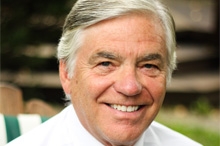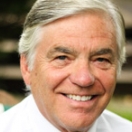

Dr. William Rom is being honored as a Champion of Change for him work on the front lines to protect public health in a changing climate.
As author of Environmental Policy and Public Health: Air Pollution, Global Climate Change, and Wilderness and an instructor on environmental and global health at New York University for 25 years, I have reached dozens of policy students and medical residents and fellows. I have been involved in air pollution policy for the past decade, leading the American Thoracic Society’s Environmental Health Policy Committee, presenting data to the Clean Air Scientific Advisory Committee and meeting with the EPA Administrator to encourage stricter standards ground level ozone and particulate matter to protect human health. I delivered Medical Grand Rounds on Climate Change and Global Public Health to international meetings and medical schools from New York to Addis Ababa, Ethiopia and Cape Town, South Africa. I traveled by dogsled with the Thule Inuit in northwestern Greenland in 2008, where I found that the ice was melting faster than ever before with four more months of open seawater compared to 30 years ago. I have canoed the major Arctic Rivers including the Albany, Churchill, Back and South Nahanni. As a Fellow for two decades at The Explorer’s Club, I have been awarded four Flag expeditions, including travel with the Thule Inuit by dogsled in northern Greenland to obtain eyewitness accounts of the effects of global warming. To inform my professional colleagues, I have organized symposia on the topic for pulmonary doctors over the past decade. Currently, Dr. Kent Pinkerton and I are co-editing a textbook on Climate Change and Global Public Health.
Climate change is projected to exacerbate heat waves and interactions with air pollutants to increase cardiorespiratory mortality. Hurricanes may become more frequent and intense, but most worrisome are potential storm surges that can cause widespread damage. New York University and Bellevue Hospitals, where I work, are still recovering from Hurricane Sandy’s 13-foot storm surge. The salt water damaged hospital electrical infrastructure in the basements of both hospitals, and we were forced to relocate for three months. This resulted in patient evacuations and required the salvage of many thousands of research samples.
As Director of NYU’s Division of Pulmonary, Critical Care, and Sleep Medicine and Bellevue Hospital’s Chest Service for 25 years, I have witnessed environmental medicine first hand. When air pollution particulates and ground-level ozone increase, we admit more asthma patients and chronic obstructive pulmonary disease patients in our Chest Service and ICU.
I am also interested in the “smoky houses” problem from indoor biomass burning and have recently chronicled this challenge in photos from Ethiopia and Madagascar. At Addis Ababa’s Black Lion Hospital I served as faculty, training their first two pulmonary fellows. We observed lung disease, pneumonia, and lung cancer from indoor air pollution.
I served as a legislative fellow in health and environmental policy in the U.S. Senate for Senator Hillary Rodham Clinton. For her, I wrote the Caribbean Wilderness Act (signed into law by President Bush), the Family Asthma Act, the Environmental Public Health Tracking Act, and the Electronic Medical Record and Health Quality Act. I served on the Environmental Roundtable for Research and Education in the Environmental Health Sciences of the Institute of Medicine and am on CDC’s WTC Health Program Scientific/Technical Advisory Committee.
Through all of my work, I’ve found it is critical to reach a larger stage on climate change and explain how its consequences affect our health.
Dr. William Rom is Director of the New York University Pulmonary Division and Bellevue Hospital Chest Service.


